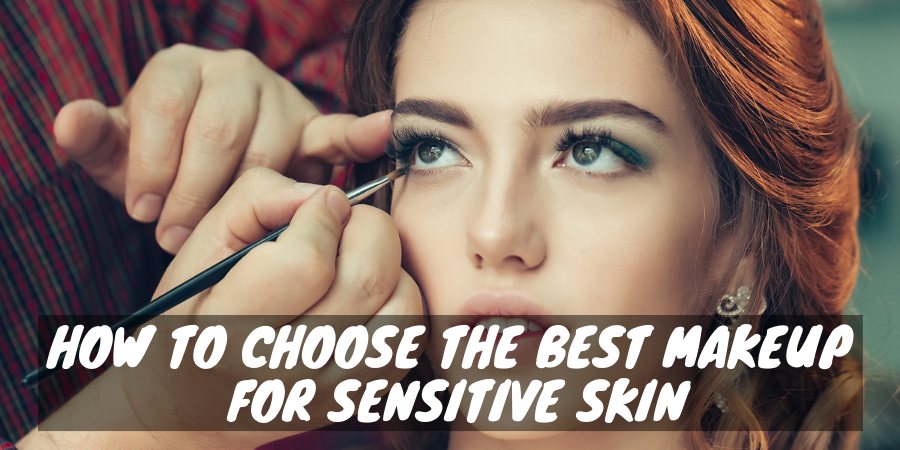From runways to magazines to social media, you’re constantly inspired to create beautiful and unique makeup looks.
The one thing that’s holding you back: your sensitive skin.
After all, you don’t want to spend money on flashy eyeshadow palettes and expensive foundations if there’s a good chance that they’ll make your skin flare up.
And makeup brands often neglect to disclose whether their products are suitable for sensitive skin or not.
But if you learn to interpret product labels and modify your beauty routine, you can wear and experiment with makeup just as freely as everyone else.
What Is Sensitive Skin?
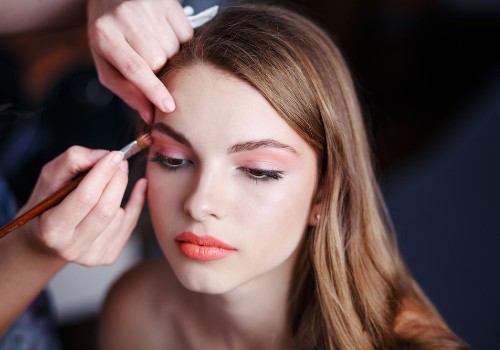
Many people think of sensitive skin as a skin type, but it’s more accurate to refer to it as a subtype.
That’s because any of the four main skin types — normal, dry, oily and combination — can also be sensitive.
Sensitive skin is, in a nutshell, skin that overreacts to various stimuli: touch, air quality, friction and especially skin products.
When it comes in contact with these things, it reacts quickly and adversely. Itching, bumps, redness, flaking and and a warming or burning sensation are all common reactions.
Many common skincare and makeup ingredients can set off sensitive skin: fragrances, dyes, sulfates, parabens, strong alcohols and many essential oils are frequent triggers.
How Do I Know if I Have Sensitive Skin?
Does your skin frequently burn or sting after you apply makeup or skincare products?
Is it constantly flushed red as if you’re sunburned, or do you often deal with rashes and hives?
Does your skin itch and flake no matter how much you hydrate and moisturize?
Is your face always covered in little bumps, papules and pustules that don’t respond to acne treatment?
If you answered “yes” to any of these questions, your skin could very well be classified as sensitive. And if you answered “yes” to more than one, your skin is almost definitely sensitive.
How to Choose and Use Makeup for Sensitive Skin
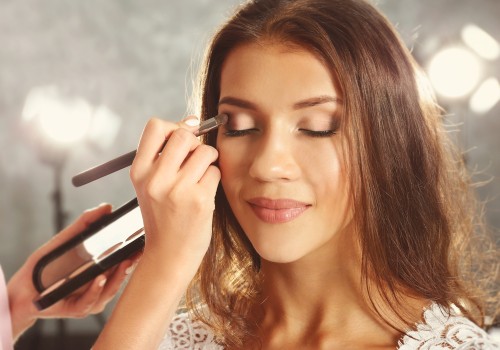
Should I Use Hypoallergenic Makeup?
A recent boom in popularity has made hypoallergenic makeup easily available no matter where you shop.
And for some people with sensitive skin, it can make the difference between irritated and impeccable skin.
Not all sensitive skin is the result of true allergies, but yours very well could be. Some makeup ingredients are notorious for causing allergic reactions, especially fragrances, dyes and preservatives.
Hypoallergenic makeup specifically avoids these ingredients, so it’s less likely to cause an adverse reaction.
Some brands, like Almay, Jane Iredale, Clinique and Physician’s Formula, formulate all of their products to be hypoallergenic. Other brands, including CoverGirl and Nars, offer some hypoallergenic products in their lineup.
Many people with sensitive skin find that switching to hypoallergenic makeup relieves their irritation, leaving them free to wear their makeup the way they want to. It’s well worth it to try going hypoallergenic to see if it makes a difference for your skin.
Is Mineral Makeup Good for Sensitive Skin?
A majority of the makeup products on the market are formulated with chemicals, additives, dyes and other irritants, making them unsuitable for sensitive skin.
But chemical makeup isn’t the only option. There’s also mineral makeup, which contains natural minerals rather than irritating, lab-made chemicals.
Many dermatologists recommend mineral makeup for those with sensitive skin. Because it contains fewer allergens and pore-clogging ingredients, it tends to be tolerated much better by highly-reactive skin.
Popular mineral makeup brands include Physician’s Formula and bareMinerals. Other brands, including L’Oréal, Maybelline and NYX, offer some mineral makeup in their product lines.
Should I Try Multitasking Makeup Products?
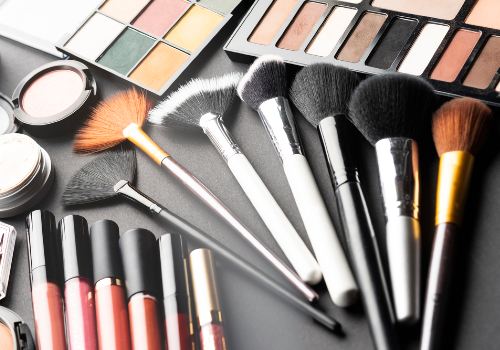
These days, makeup isn’t just makeup — it’s skincare, too.
Many makeup products combine pigment and coverage with benefits like hydration, sun protection and vitamins. You can purchase primer with SPF built in, foundation that contains a vitamin E serum, and even blush that can be used as a lip balm.
When you have sensitive skin, you should aim to use as few products as possible. Every new product you add increases your chance of having a bad reaction, so minimizing your routine is key to keeping your skin calm.
That makes these multitasking products perfect for those with sensitive skin. With your makeup pulling double (or even triple) duty, you’ll lower your risk of causing a flare-up without sacrificing any benefits.
What Makeup Ingredients Should I Avoid if I Have Sensitive Skin?

Several common makeup ingredients are some of the biggest triggers for sensitive skin. Always check the ingredients and skip any product that contains these known irritants.
Sodium Lauryl Sulfate
Often found in foundations, sodium lauryl sulfate is also the main component of many shampoos, soaps and toothpastes.
But it’s known to disrupt your skin’s oil barrier and pH, cause irritation, clog pores and exacerbate acne.
Parabens
There are many different parabens found in makeup products — too many to list, in fact.
However, you’ll be able to identify them quite easily: they all end in -paraben.
Parabens are used as preservatives in all kinds of makeup. However, they frequently cause contact dermatitis and allergic reactions, and studies suggest that they may be linked to cancer.
Petroleum Distillates
Used to thicken and smooth foundation, eyeshadow, mascara and other products, petroleum distillates are irritating to the skin and should be avoided.
Additionally, they’re frequently contaminated with carcinogens. The problem is serious enough that they’re banned in the EU, though they’re still common in America.
Fragrances
You’ll often see these listed as the final ingredient in makeup and skincare products. That means there’s very little of them in the product, so they shouldn’t set your skin off, right?
As it turns out, even a tiny bit of fragrance is enough to set off sensitive skin. In fact, it’s one of the five most common cosmetic allergens as defined by the FDA.
And it doesn’t just go by the name “fragrance,” either. Some companies break their fragrances down into specific compounds (like limonene, linalool, eugenol and benzyl alcohol) for their ingredients lists.
Fragrances are highly concentrated and aren’t always labeled as such, so it’s best to familiarize yourself with their pseudonyms and avoid them altogether.
How Can I Prep My Sensitive Skin Before Applying Makeup?
Your makeup prep routine is just as important as the makeup itself. By taking a few simple precautions during your morning skincare routine, you can help you skin tolerate makeup better.
If you find that your skin is more sensitive after cleansing, it may be wise to skip your morning cleanse and simply rinse your face with lukewarm water instead. And if you do need to cleanse, use a gentle cleanser and a gentle hand to minimize irritation.
Then follow up with a hypoallergenic moisturizer. Look for natural ingredients like aloe, cucumber, prickly pear, algae and manuka honey to hydrate and protect your skin.
By establishing a good moisture barrier on your skin, you’ll reduce the irritation caused by makeup and keep your skin hydrated throughout the day.
How Should I Remove My Makeup Without Irritating My Skin?
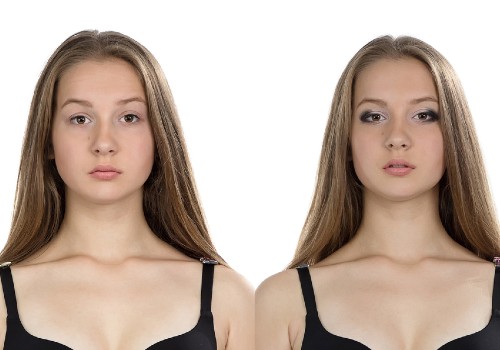
Many makeup removers contain ingredients like phthalates and formaldehyde, which are known to cause severe skin irritation.
In case that wasn’t reason enough to avoid them, they’re also responsible for headaches, breathing problems and birth defects.
Look for a makeup remover that doesn’t contain these ingredients. And if possible, use a balm, cream or oil formula rather than a liquid one — liquid makeup removers require you to use more product at a time, increasing your risk of irritation.
Avoid makeup removal wipes, which pull and tug at the skin. This friction often results in a bad flare-up, especially if your skin is already irritated by your makeup.

